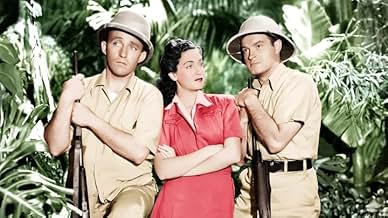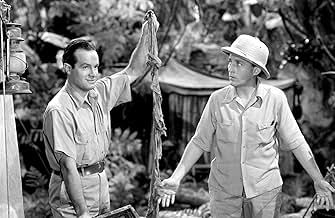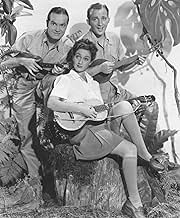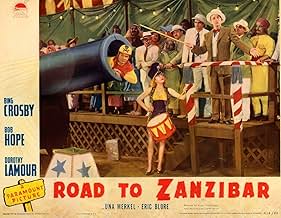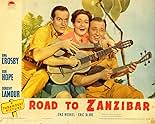IMDb-BEWERTUNG
6,7/10
3489
IHRE BEWERTUNG
Füge eine Handlung in deiner Sprache hinzuStranded in Africa, Chuck and his pal Fearless have comic versions of jungle adventures, featuring two attractive con women.Stranded in Africa, Chuck and his pal Fearless have comic versions of jungle adventures, featuring two attractive con women.Stranded in Africa, Chuck and his pal Fearless have comic versions of jungle adventures, featuring two attractive con women.
- Auszeichnungen
- 3 wins total
John Ralph Bilbo
- Solomon
- (Nicht genannt)
Al Bridge
- Colonial Policeman with Inspector
- (Nicht genannt)
Ken Carpenter
- Commentator
- (Nicht genannt)
Empfohlene Bewertungen
Of the comedy teams that made a series of movies in the 1940s and 1950s, Hope and Crosby were probably the most engagingly amusing.
Abbott and Costello were usually silly. Their movies seemed aimed at an audience of children, although some, like "Meet Frankenstein", are outrageous. There was an element of sadism too, with Abbott (always the humorless straight man) slapping the helpless Costello around and snarling at him, a standard relationship left over I guess from vaudeville where clowns batted each other over the head with bladders.
Martin and Lewis were clearly differentiated. Martin was the parent and Lewis was the twelve-year-old child. It all seems a bit much, now.
But Hope and Crosby were the most nearly equal. Crosby was the smooth-talking crooner. Both were cowards but Hope was a braggart too, a stock figure in the comedies of Ancient Rome and afterward. I think the figure was called miles gloriosus. What they had that the other teams didn't, and what's on good display here, is a kidding quality that consists of trying to outwit one another, competition for the girl (Dorothy Lamour), inside jokes, and a kind of comfortably relaxed unspoken friendship that draws the audience in.
In many ways the funniest scene is when Hope and Crosby realize they've been double crossed by Lamour and set out to find her and tell her off. They discover some shreds of her clothing and conclude, mistakenly, that she's been eaten by leopards and carried off. (Hope: "They didn't even leave an ear. What hogs those leopards are.") The two men try to mourn her passing in a sincere and dignified way but their anger at her keeps simmering to the surface. They interrupt their weeping to recite some poetry over her buried clothing but they don't know any poems. Hope starts off with, "A bunch of the boys were whooping it up/ in the Malamut saloon..." Crosby chides him and instead begins to recite "Casey at the Bat." The scene simply cracks me up. Crosby: "She was just a kid." Hope: "We'll miss her. Even though she was WRONG!" When they realize she's still alive they sneer and kick away the dirt from her "grave."
I don't think of "The Road to Zanzibar" as necessarily their best Road picture, although it's right up there with "Utopia" and "Morocco." It was basically their first though. The earlier "Road to Singapore" lacked the lazy improvisational impression that this one has. "Singapore" seems, in retrospect, too well plotted, if you can imagine. You've gotta give these guys a little room to kick out.
The plot's absurd anyway. Africa on the Paramount set, with phony drums and "natives" and a guy in a gorilla suit engaged in a professional wrestling match with Hope. Actually, Hope's pretty amusing. Woody Allen has said that he picked up quite a few of Hope's comic mannerisms to use in his own performances. (See also Hope's "They've Got Me Covered," a classic of its kind, so to speak.) And Crosby is a necessary counterpart to Hope's physicality. The two work very well together.
I'll have to throw in one of their exchanges. The pair find themselves broke and stranded in a small African town.
Hope (gloomily): "This must be the nowhere that people say they're 500 miles from."
Crosby: "Well don't blame me. We wouldn't be here if you hadn't sold the map to that diamond mine."
Hope: "Hah! It's your fault! If you hadn't bought it I wouldn't have had it. And if I didn't have it I couldn't sell it. So if I couldn't sell it, then we wouldn't be stuck here, would we?"
Crosby: "Nope."
Hope (looks doubtful for a moment, thinking hard): "I don't get it."
Their movies also produced a number of popular songs, some of which have become standards. This one has "It's Always You." Others have songs like "Moonlight Becomes You."
You'll probably enjoy this one. If you're in the proper mood, it will crack you up.
Abbott and Costello were usually silly. Their movies seemed aimed at an audience of children, although some, like "Meet Frankenstein", are outrageous. There was an element of sadism too, with Abbott (always the humorless straight man) slapping the helpless Costello around and snarling at him, a standard relationship left over I guess from vaudeville where clowns batted each other over the head with bladders.
Martin and Lewis were clearly differentiated. Martin was the parent and Lewis was the twelve-year-old child. It all seems a bit much, now.
But Hope and Crosby were the most nearly equal. Crosby was the smooth-talking crooner. Both were cowards but Hope was a braggart too, a stock figure in the comedies of Ancient Rome and afterward. I think the figure was called miles gloriosus. What they had that the other teams didn't, and what's on good display here, is a kidding quality that consists of trying to outwit one another, competition for the girl (Dorothy Lamour), inside jokes, and a kind of comfortably relaxed unspoken friendship that draws the audience in.
In many ways the funniest scene is when Hope and Crosby realize they've been double crossed by Lamour and set out to find her and tell her off. They discover some shreds of her clothing and conclude, mistakenly, that she's been eaten by leopards and carried off. (Hope: "They didn't even leave an ear. What hogs those leopards are.") The two men try to mourn her passing in a sincere and dignified way but their anger at her keeps simmering to the surface. They interrupt their weeping to recite some poetry over her buried clothing but they don't know any poems. Hope starts off with, "A bunch of the boys were whooping it up/ in the Malamut saloon..." Crosby chides him and instead begins to recite "Casey at the Bat." The scene simply cracks me up. Crosby: "She was just a kid." Hope: "We'll miss her. Even though she was WRONG!" When they realize she's still alive they sneer and kick away the dirt from her "grave."
I don't think of "The Road to Zanzibar" as necessarily their best Road picture, although it's right up there with "Utopia" and "Morocco." It was basically their first though. The earlier "Road to Singapore" lacked the lazy improvisational impression that this one has. "Singapore" seems, in retrospect, too well plotted, if you can imagine. You've gotta give these guys a little room to kick out.
The plot's absurd anyway. Africa on the Paramount set, with phony drums and "natives" and a guy in a gorilla suit engaged in a professional wrestling match with Hope. Actually, Hope's pretty amusing. Woody Allen has said that he picked up quite a few of Hope's comic mannerisms to use in his own performances. (See also Hope's "They've Got Me Covered," a classic of its kind, so to speak.) And Crosby is a necessary counterpart to Hope's physicality. The two work very well together.
I'll have to throw in one of their exchanges. The pair find themselves broke and stranded in a small African town.
Hope (gloomily): "This must be the nowhere that people say they're 500 miles from."
Crosby: "Well don't blame me. We wouldn't be here if you hadn't sold the map to that diamond mine."
Hope: "Hah! It's your fault! If you hadn't bought it I wouldn't have had it. And if I didn't have it I couldn't sell it. So if I couldn't sell it, then we wouldn't be stuck here, would we?"
Crosby: "Nope."
Hope (looks doubtful for a moment, thinking hard): "I don't get it."
Their movies also produced a number of popular songs, some of which have become standards. This one has "It's Always You." Others have songs like "Moonlight Becomes You."
You'll probably enjoy this one. If you're in the proper mood, it will crack you up.
10eearwigg
I think that Road to Zanzibar is hilarious, one of the best Road movies. The gorilla fight made me laugh the hardest. I would recommend all of the Road movies, if you liked this one. The singing and all of the jokes were great. Bob Hope is one of the funniest people, and in my mind, he is still alive...kinda.
"The Road to Zanzibar" scores in all departments! The interplay between Hope, Crosby, and Lamour is outstanding. A wonderful addition to this trio comes in the form of Una Merkel, playing Lamour's friend. She and Bob Hope made an inspired dream comedy team. Their scenes together are hilarious. Dorothy Lamour displayed a biting comic edge to her lines not usually displayed in her comedies.
The photography is moody, diffuse, reminiscent of von Sternberg's films. A real treat for comedy and cinema fans!
The photography is moody, diffuse, reminiscent of von Sternberg's films. A real treat for comedy and cinema fans!
This early entry in the Hope and Crosby canon may be their best. The Don Hartman gags are still fresh, and Bob and Bing are young enough to be romantic leads, which indeed they are. A spoof of the kind of jungle adventure movie popular at the time, one's enjoyment of this now more than sixty year old film may depend in part on the kind of movie it's making fun of, otherwise it might seem just plain absurd. It is anyway. Absurd I mean. Also very funny. The studio jungle looks like a studio jungle, which only adds to the air of the ridiculous, as does Bing's breaking into song at odd moments. Leading ladies Dorothy Lamour and Una Merkel are good foils for (as they used to call them) the boys. Good fun, and a great movie for the holidays.
A previous reviewer said something interesting about this second Road picture being a satire on all those Hollywood jungle epics. A pet peeve of mine has always been that American's concepts of Africa came out of those films. We were not in the imperialist game in Africa which was good, but we also knew nothing about these people, their politics and culture, and in some respects we're paying for that ignorance.
That being said, I can't hold up Road to Zanzibar for that kind of criticism. It's a comedy and a funny one. With the success of the Road to Singapore and the obvious chemistry between Bob and Bing, the boys could now unload their monkeyshines on the audience full blast.
This film marked the beginning of a long association between composer James Van Heusen and Bing Crosby. Van Heusen was replacing Jimmy Monaco as partner to Johnny Burke, lyricist, and this was the first of many Crosby films they would score.
And the songs followed the usual Road picture pattern. Bing starts the movie off by singing You Lucky People You under the opening credits and continuing it in the opening scene at a carnival sideshow, a nice patented Crosby philosophical number. Dotty sings You're Dangerous while trying to vamp Hope the schnook. But then Bing croons to Dotty It's Always You another ballad and finally Hope and Crosby have a patter number Birds of a Feather sung in up tempo as the law is closing in. In that same scene is Eric Blore, better known for Fred Astaire films and he contributes to the clowning with a nice touch.
In a sense this is the first real Road picture because Singapore didn't have a lot of the spontaneity the others do because no one figured it would be such a hit. So get out and hit the Road.
That being said, I can't hold up Road to Zanzibar for that kind of criticism. It's a comedy and a funny one. With the success of the Road to Singapore and the obvious chemistry between Bob and Bing, the boys could now unload their monkeyshines on the audience full blast.
This film marked the beginning of a long association between composer James Van Heusen and Bing Crosby. Van Heusen was replacing Jimmy Monaco as partner to Johnny Burke, lyricist, and this was the first of many Crosby films they would score.
And the songs followed the usual Road picture pattern. Bing starts the movie off by singing You Lucky People You under the opening credits and continuing it in the opening scene at a carnival sideshow, a nice patented Crosby philosophical number. Dotty sings You're Dangerous while trying to vamp Hope the schnook. But then Bing croons to Dotty It's Always You another ballad and finally Hope and Crosby have a patter number Birds of a Feather sung in up tempo as the law is closing in. In that same scene is Eric Blore, better known for Fred Astaire films and he contributes to the clowning with a nice touch.
In a sense this is the first real Road picture because Singapore didn't have a lot of the spontaneity the others do because no one figured it would be such a hit. So get out and hit the Road.
Wusstest du schon
- PatzerWhen Lamour and Crosby are in the rowboat on the lake, harp music plays when they dangle their hands in the water. At the end of the song Crosby sings, the harp music begins before Lamour puts her hand in the water. You can see her surprised look when she realizes she is late.
- Zitate
Chuck Reardon: Everybody knows him. He's a philathropist.
Hubert 'Fearless' Frazier: I don't care who he votes for. I want my money.
- VerbindungenFeatured in The 69th Annual Academy Awards (1997)
- SoundtracksRoad to Zanzibar
(uncredited)
Music by Jimmy Van Heusen
Lyrics by Johnny Burke
[Sung by Bing Crosby and chorus while on safari]
Top-Auswahl
Melde dich zum Bewerten an und greife auf die Watchlist für personalisierte Empfehlungen zu.
- How long is Road to Zanzibar?Powered by Alexa
Details
- Laufzeit1 Stunde 31 Minuten
- Farbe
- Seitenverhältnis
- 1.37 : 1
Zu dieser Seite beitragen
Bearbeitung vorschlagen oder fehlenden Inhalt hinzufügen

Oberste Lücke
By what name was Der Weg nach Sansibar (1941) officially released in India in English?
Antwort

